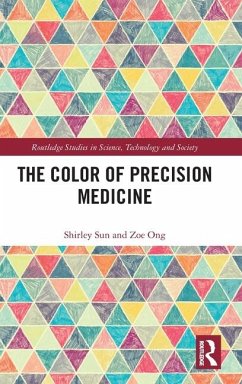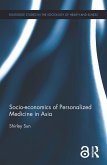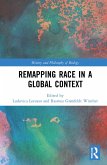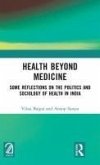- Gebundenes Buch
- Merkliste
- Auf die Merkliste
- Bewerten Bewerten
- Teilen
- Produkt teilen
- Produkterinnerung
- Produkterinnerung
This book proposes the concept of racialization of precision medicine, defined as the social processes by which racial/ethnic categories are incorporated (or not) into the development, interpretation and implementation of precision medicine research and practice. An important resource on how to deracialize precision medicine
Andere Kunden interessierten sich auch für
![Socio-economics of Personalized Medicine in Asia Socio-economics of Personalized Medicine in Asia]() Shirley SunSocio-economics of Personalized Medicine in Asia231,99 €
Shirley SunSocio-economics of Personalized Medicine in Asia231,99 €![Bioethics, Genetics and Sport Bioethics, Genetics and Sport]() Silvia CamporesiBioethics, Genetics and Sport196,99 €
Silvia CamporesiBioethics, Genetics and Sport196,99 €![Kinship and Demographic Behavior in the Past Kinship and Demographic Behavior in the Past]() Tommy Bengtsson / Geraldine P. Mineau (eds.)Kinship and Demographic Behavior in the Past75,99 €
Tommy Bengtsson / Geraldine P. Mineau (eds.)Kinship and Demographic Behavior in the Past75,99 €![Living with the Genome Living with the Genome]() Angus ClarkeLiving with the Genome38,99 €
Angus ClarkeLiving with the Genome38,99 €![Remapping Race in a Global Context Remapping Race in a Global Context]() Remapping Race in a Global Context198,99 €
Remapping Race in a Global Context198,99 €![The Evolution of Ethics in America The Evolution of Ethics in America]() Laurence Armand FrenchThe Evolution of Ethics in America197,99 €
Laurence Armand FrenchThe Evolution of Ethics in America197,99 €![Health Beyond Medicine Health Beyond Medicine]() Vikas BajpaiHealth Beyond Medicine198,99 €
Vikas BajpaiHealth Beyond Medicine198,99 €-
-
-
This book proposes the concept of racialization of precision medicine, defined as the social processes by which racial/ethnic categories are incorporated (or not) into the development, interpretation and implementation of precision medicine research and practice. An important resource on how to deracialize precision medicine
Hinweis: Dieser Artikel kann nur an eine deutsche Lieferadresse ausgeliefert werden.
Hinweis: Dieser Artikel kann nur an eine deutsche Lieferadresse ausgeliefert werden.
Produktdetails
- Produktdetails
- Verlag: Taylor & Francis
- Seitenzahl: 148
- Erscheinungstermin: 23. April 2024
- Englisch
- Abmessung: 234mm x 156mm x 11mm
- Gewicht: 404g
- ISBN-13: 9781032565583
- ISBN-10: 1032565586
- Artikelnr.: 70151303
- Herstellerkennzeichnung
- Libri GmbH
- Europaallee 1
- 36244 Bad Hersfeld
- gpsr@libri.de
- Verlag: Taylor & Francis
- Seitenzahl: 148
- Erscheinungstermin: 23. April 2024
- Englisch
- Abmessung: 234mm x 156mm x 11mm
- Gewicht: 404g
- ISBN-13: 9781032565583
- ISBN-10: 1032565586
- Artikelnr.: 70151303
- Herstellerkennzeichnung
- Libri GmbH
- Europaallee 1
- 36244 Bad Hersfeld
- gpsr@libri.de
Shirley Sun is an associate professor of sociology at the Nanyang Technological University (NTU), Singapore. Her research areas are medical sociology and sociology of science, knowledge, and technology. She is the author of "Socio-economics of Personalized Medicine in Asia" (2017, London and New York: Routledge). Zoe Ong is a PhD candidate from the Interdisciplinary Graduate Program at the Wee Kim Wee School of Communication and Information, Nanyang Technological University (NTU), Singapore. With an MSc in biological sciences, her research interests include cancer and genetics, digital health, health communication, and health literacy.
Table of Contents
1 . Introduction
Precision medicine (PM): A global phenomenon
What is precision medicine? Definitions, sites and scale.
Precision medicine as an alternative to race-based medicine
What is race-based medicine and racial profiling in medicine?
Problems with race-based medicine/racial profiling in medicine
Is genome-based precision medicine really the answer?
Addressing the debate: Racialization as the key concept
Racialization of national census categories
Racialization in science (or, scientific racism) in colonial contexts
Racialization of medicine in colonial contexts
Racialization in medicine in contemporary times
In the (post-)Genomic Era: Racialization of human genomic science
What is the future of genome-based precision medicine? An empirical
examination in cancer care in three post-colonial societies.
Chapter outline
2 . Using race to overcome race: An inherent contradiction in precision
medicine
Introduction
Using race to overcome race: understanding an inherent contradiction in
translational precision medicin
First domain: Searching for the genetic biomarker in scientific research
Second domain: Recruiting suitable human subjects for clinical trials
Third domain: Medical decision-making in the clinic
Conclusion
3. Trans-National colors: Race, Ethnicity and Genomic Science in the United
States of America, Canada and Singapore
Introduction
Is race biological or socially constructed? A brief overview.
Where and how do racialization happen in genomic science?
Materials for racialization of a population sample and/or patient
Issues with the different ways of racialization
Perspectives from the genomic science community about the relationship
between race and genetics
No clear distinction between ethnoracial population groups
Genetic heterogeneity within an ethnoracial population group
Race as a social construct
If race is socially constructed, why are there differences in frequencies
of genetic alleles between racial/ethnic groups?
If not race, what drives human genomic diversity?
Conclusion
4. The "relative resources" model: Heterogeneity of resources and the
racialization of precision medicine
Introduction
The "personalized medicine" versus "racialized medicine" debate
"Race is really the poor man's genomic test": The relative resources model
Human and informatics resources
5. Pharmacogenetic/Pharmacogenomic Drug Toxicity Studies, Race/Ethnicity
and Managing Adverse Drug Reactions in the Clinic: Ongoing Tensions
Introduction
Examples of racialised pharmacogenomic studies in the US, Canada and
Singapore
Allopurinol
5-Fluorouracil (5-FU)
Cost-effectiveness studies, race/ethnicity and precision medicine
Who is Asian and who is Caucasian?
Debating race/ethnicity-based pharmacogenetic toxicity data in the clinic
Subjective interpretation of drug toxicity risks
Toxicity is a multi-factor phenomenon and is not just about genetics
Pharmacogenetics/pharmacogenomics studies and pharmaceutical companies are
at odds.
Conclusion
6 Conclusion
What is already known on the topics of race-based medicine, precision
medicine, and the molecularization of race?
What does this book add to the existing state of the art?
What are the arguments and findings in each chapter?
How might this study affect research, practice or policy?
Research
Practice
Policy
Science communication by scientists and journalists
Medical education
What should different stakeholders take away from this book?
Scientists
Physicians/medical doctors
Public policy makers
Health economists
What are the theoretical and empirical contributions of this book?
On "racialization"
On the nexus of relative resources and racialization of precision medicine
On differential racialization
What are the tensions with the usage of race/ethnicity in genomic science
with medical and public health implications?
What are some of the limitations of this study?
What are some of the future research projects based on this book?
1 . Introduction
Precision medicine (PM): A global phenomenon
What is precision medicine? Definitions, sites and scale.
Precision medicine as an alternative to race-based medicine
What is race-based medicine and racial profiling in medicine?
Problems with race-based medicine/racial profiling in medicine
Is genome-based precision medicine really the answer?
Addressing the debate: Racialization as the key concept
Racialization of national census categories
Racialization in science (or, scientific racism) in colonial contexts
Racialization of medicine in colonial contexts
Racialization in medicine in contemporary times
In the (post-)Genomic Era: Racialization of human genomic science
What is the future of genome-based precision medicine? An empirical
examination in cancer care in three post-colonial societies.
Chapter outline
2 . Using race to overcome race: An inherent contradiction in precision
medicine
Introduction
Using race to overcome race: understanding an inherent contradiction in
translational precision medicin
First domain: Searching for the genetic biomarker in scientific research
Second domain: Recruiting suitable human subjects for clinical trials
Third domain: Medical decision-making in the clinic
Conclusion
3. Trans-National colors: Race, Ethnicity and Genomic Science in the United
States of America, Canada and Singapore
Introduction
Is race biological or socially constructed? A brief overview.
Where and how do racialization happen in genomic science?
Materials for racialization of a population sample and/or patient
Issues with the different ways of racialization
Perspectives from the genomic science community about the relationship
between race and genetics
No clear distinction between ethnoracial population groups
Genetic heterogeneity within an ethnoracial population group
Race as a social construct
If race is socially constructed, why are there differences in frequencies
of genetic alleles between racial/ethnic groups?
If not race, what drives human genomic diversity?
Conclusion
4. The "relative resources" model: Heterogeneity of resources and the
racialization of precision medicine
Introduction
The "personalized medicine" versus "racialized medicine" debate
"Race is really the poor man's genomic test": The relative resources model
Human and informatics resources
5. Pharmacogenetic/Pharmacogenomic Drug Toxicity Studies, Race/Ethnicity
and Managing Adverse Drug Reactions in the Clinic: Ongoing Tensions
Introduction
Examples of racialised pharmacogenomic studies in the US, Canada and
Singapore
Allopurinol
5-Fluorouracil (5-FU)
Cost-effectiveness studies, race/ethnicity and precision medicine
Who is Asian and who is Caucasian?
Debating race/ethnicity-based pharmacogenetic toxicity data in the clinic
Subjective interpretation of drug toxicity risks
Toxicity is a multi-factor phenomenon and is not just about genetics
Pharmacogenetics/pharmacogenomics studies and pharmaceutical companies are
at odds.
Conclusion
6 Conclusion
What is already known on the topics of race-based medicine, precision
medicine, and the molecularization of race?
What does this book add to the existing state of the art?
What are the arguments and findings in each chapter?
How might this study affect research, practice or policy?
Research
Practice
Policy
Science communication by scientists and journalists
Medical education
What should different stakeholders take away from this book?
Scientists
Physicians/medical doctors
Public policy makers
Health economists
What are the theoretical and empirical contributions of this book?
On "racialization"
On the nexus of relative resources and racialization of precision medicine
On differential racialization
What are the tensions with the usage of race/ethnicity in genomic science
with medical and public health implications?
What are some of the limitations of this study?
What are some of the future research projects based on this book?
Table of Contents
1 . Introduction
Precision medicine (PM): A global phenomenon
What is precision medicine? Definitions, sites and scale.
Precision medicine as an alternative to race-based medicine
What is race-based medicine and racial profiling in medicine?
Problems with race-based medicine/racial profiling in medicine
Is genome-based precision medicine really the answer?
Addressing the debate: Racialization as the key concept
Racialization of national census categories
Racialization in science (or, scientific racism) in colonial contexts
Racialization of medicine in colonial contexts
Racialization in medicine in contemporary times
In the (post-)Genomic Era: Racialization of human genomic science
What is the future of genome-based precision medicine? An empirical
examination in cancer care in three post-colonial societies.
Chapter outline
2 . Using race to overcome race: An inherent contradiction in precision
medicine
Introduction
Using race to overcome race: understanding an inherent contradiction in
translational precision medicin
First domain: Searching for the genetic biomarker in scientific research
Second domain: Recruiting suitable human subjects for clinical trials
Third domain: Medical decision-making in the clinic
Conclusion
3. Trans-National colors: Race, Ethnicity and Genomic Science in the United
States of America, Canada and Singapore
Introduction
Is race biological or socially constructed? A brief overview.
Where and how do racialization happen in genomic science?
Materials for racialization of a population sample and/or patient
Issues with the different ways of racialization
Perspectives from the genomic science community about the relationship
between race and genetics
No clear distinction between ethnoracial population groups
Genetic heterogeneity within an ethnoracial population group
Race as a social construct
If race is socially constructed, why are there differences in frequencies
of genetic alleles between racial/ethnic groups?
If not race, what drives human genomic diversity?
Conclusion
4. The "relative resources" model: Heterogeneity of resources and the
racialization of precision medicine
Introduction
The "personalized medicine" versus "racialized medicine" debate
"Race is really the poor man's genomic test": The relative resources model
Human and informatics resources
5. Pharmacogenetic/Pharmacogenomic Drug Toxicity Studies, Race/Ethnicity
and Managing Adverse Drug Reactions in the Clinic: Ongoing Tensions
Introduction
Examples of racialised pharmacogenomic studies in the US, Canada and
Singapore
Allopurinol
5-Fluorouracil (5-FU)
Cost-effectiveness studies, race/ethnicity and precision medicine
Who is Asian and who is Caucasian?
Debating race/ethnicity-based pharmacogenetic toxicity data in the clinic
Subjective interpretation of drug toxicity risks
Toxicity is a multi-factor phenomenon and is not just about genetics
Pharmacogenetics/pharmacogenomics studies and pharmaceutical companies are
at odds.
Conclusion
6 Conclusion
What is already known on the topics of race-based medicine, precision
medicine, and the molecularization of race?
What does this book add to the existing state of the art?
What are the arguments and findings in each chapter?
How might this study affect research, practice or policy?
Research
Practice
Policy
Science communication by scientists and journalists
Medical education
What should different stakeholders take away from this book?
Scientists
Physicians/medical doctors
Public policy makers
Health economists
What are the theoretical and empirical contributions of this book?
On "racialization"
On the nexus of relative resources and racialization of precision medicine
On differential racialization
What are the tensions with the usage of race/ethnicity in genomic science
with medical and public health implications?
What are some of the limitations of this study?
What are some of the future research projects based on this book?
1 . Introduction
Precision medicine (PM): A global phenomenon
What is precision medicine? Definitions, sites and scale.
Precision medicine as an alternative to race-based medicine
What is race-based medicine and racial profiling in medicine?
Problems with race-based medicine/racial profiling in medicine
Is genome-based precision medicine really the answer?
Addressing the debate: Racialization as the key concept
Racialization of national census categories
Racialization in science (or, scientific racism) in colonial contexts
Racialization of medicine in colonial contexts
Racialization in medicine in contemporary times
In the (post-)Genomic Era: Racialization of human genomic science
What is the future of genome-based precision medicine? An empirical
examination in cancer care in three post-colonial societies.
Chapter outline
2 . Using race to overcome race: An inherent contradiction in precision
medicine
Introduction
Using race to overcome race: understanding an inherent contradiction in
translational precision medicin
First domain: Searching for the genetic biomarker in scientific research
Second domain: Recruiting suitable human subjects for clinical trials
Third domain: Medical decision-making in the clinic
Conclusion
3. Trans-National colors: Race, Ethnicity and Genomic Science in the United
States of America, Canada and Singapore
Introduction
Is race biological or socially constructed? A brief overview.
Where and how do racialization happen in genomic science?
Materials for racialization of a population sample and/or patient
Issues with the different ways of racialization
Perspectives from the genomic science community about the relationship
between race and genetics
No clear distinction between ethnoracial population groups
Genetic heterogeneity within an ethnoracial population group
Race as a social construct
If race is socially constructed, why are there differences in frequencies
of genetic alleles between racial/ethnic groups?
If not race, what drives human genomic diversity?
Conclusion
4. The "relative resources" model: Heterogeneity of resources and the
racialization of precision medicine
Introduction
The "personalized medicine" versus "racialized medicine" debate
"Race is really the poor man's genomic test": The relative resources model
Human and informatics resources
5. Pharmacogenetic/Pharmacogenomic Drug Toxicity Studies, Race/Ethnicity
and Managing Adverse Drug Reactions in the Clinic: Ongoing Tensions
Introduction
Examples of racialised pharmacogenomic studies in the US, Canada and
Singapore
Allopurinol
5-Fluorouracil (5-FU)
Cost-effectiveness studies, race/ethnicity and precision medicine
Who is Asian and who is Caucasian?
Debating race/ethnicity-based pharmacogenetic toxicity data in the clinic
Subjective interpretation of drug toxicity risks
Toxicity is a multi-factor phenomenon and is not just about genetics
Pharmacogenetics/pharmacogenomics studies and pharmaceutical companies are
at odds.
Conclusion
6 Conclusion
What is already known on the topics of race-based medicine, precision
medicine, and the molecularization of race?
What does this book add to the existing state of the art?
What are the arguments and findings in each chapter?
How might this study affect research, practice or policy?
Research
Practice
Policy
Science communication by scientists and journalists
Medical education
What should different stakeholders take away from this book?
Scientists
Physicians/medical doctors
Public policy makers
Health economists
What are the theoretical and empirical contributions of this book?
On "racialization"
On the nexus of relative resources and racialization of precision medicine
On differential racialization
What are the tensions with the usage of race/ethnicity in genomic science
with medical and public health implications?
What are some of the limitations of this study?
What are some of the future research projects based on this book?








